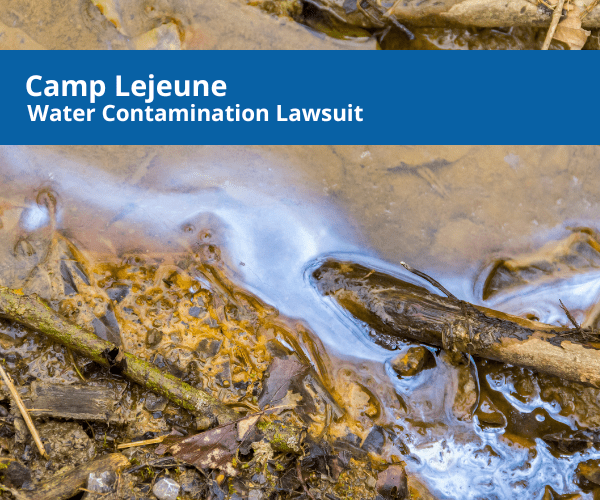
Government Lawyers Set Classification Rules for Camp Lejeune Survivors
In a sign that a resolution may be imminent, the Navy Department and Justice Department announced that they will structure the Camp Lejeune settlements into tiers. They are calling this method the “Elective Option,” which allows the Navy Department to focus its review on a few key aspects of a Camp Lejeune claim, such as the type of injury alleged and the amount of time a claimant worked or resided at Camp Lejeune.
Narrowing the scope of the review enables faster validation and, ultimately, extension of settlement offers. The Elective Option provides similar settlement offers to claimants with similar exposures and injuries with similar evidence of causation.
“The Elective Option is a critical step in bringing relief to qualifying claimants impacted by the contaminated water at Camp Lejeune, who will now have an avenue for receiving quick and early resolution of claims under the Camp Lejeune Justice Act,” said Associate Attorney General Vanita Gupta. She continued: “We are grateful for the continued partnership of the Department of the Navy and federal agencies in developing and administering this framework.”
About the Elective Option, Under Secretary of the Navy Erik Raven said, “We are committed to ensuring that every valid Camp Lejeune claim is resolved fairly and as expeditiously as possible.”
Camp Lejeune History
Construction crews broke ground on what would become Camp Lejeune, North Carolina in 1941. The facility quickly became one of the largest Marine Corps facilities in the world. However, this sudden and massive growth may have contributed to the groundwater contamination, which began in the 1950s. Even though the need for exponential growth may have facilitated the risk of toxic exposure, it does not excuse the way the Marines mishandled the known issue for decades thereafter.
Starting in 1953, people who lived or worked at Camp Lejeune drank and bathed in water polluted with extremely high levels of volatile organic compounds (VOCs). While most VOCs are not acutely or inherently toxic, exposure in high doses and ingestion can cause adverse health effects, especially to young children, pregnant women, older adults, and other vulnerable people. These adverse effects include birth defects.
Although officials knew about the problem, practically, they did nothing for twenty years. Finally, in 1974, base commanders quietly issued a directive regarding the safe disposal of industrial and other solvents, like the ones commonly used at the base’s dry cleaners, ammunition storage facilities, and repair facilities.
Eight years later, base commanders shut down the drinking water wells altogether. But the wells were back online again a few years thereafter.
As reports of adverse side effects and illnesses after exposure at Camp Lejeune mounted into the 1990s, the Marine Corps continued to deny there were any problems. Instead, officials insisted that off-base dry cleaners and other entities tainted the water. They also touted a 1997 Agency for Toxic Substances and Disease Registry (ATSDR) investigation, which concluded that cancer derived from exposure to the water was unlikely.
According to a subsequent federal investigation, ATSDR investigators overlooked evidence of benzene in the water when they prepared the report.
Finally, in 1999, the Marines notified former base residents that they “might” have ingested contaminated water. The first lawsuit was filed in 2009.
The judge dismissed that lawsuit, and subsequent actions, on a technicality. North Carolina has a statute of repose that gives survivors 10 years from the date of injury to file legal claims. After that window closes, they lose the right to obtain compensation.
The 2022 Camp Lejeune Justice Act temporarily waives the statute of repose in water contamination cases for anyone, including veterans, who spent enough time at the base. Observers estimate that as many as two million survivors may file legal claims. But it is important to note that all lawsuits must be filed within two years. The deadline is now less than a year away as President Biden signed the act into law in August 2022.
Elective Option: Tiered Diagnoses
Under the Elective Option, the Navy and Justice Departments have separated claimants into two tiers of exposure. According to the ATSDR’s findings, people with the highest exposure and, therefore, causality will most likely fall into Tier 1. These individuals have adverse side effects and diagnoses with the highest “substantiated evidence of causation.”
Tier 1 includes the follow:
- Bladder cancer
- Kidney cancer
- Leukemia
- Liver cancer
- Non-Hodgkin’s lymphoma
For Tier 2, the ATSDR’s findings are for people who have diagnoses of adverse side effects with “linked possible evidence of causation” by the toxic exposure at Camp Lejeune. These are ailments and diseases that, while serious and life altering, are not yet known to have clear causation as a result of VOCs at Camp Lejeune.
Tier 2 includes the following:
- Kidney disease
- Parkinson’s disease
- Multiple myeloma
- Systemic sclerosis
Claimants in Tier 1 will receive higher payouts than those in Tier 2. Furthermore, the Elective Option allow for additional compensation for the families of people who are now deceased as a result of their Tier 1 or 2 disease.
The Yost Legal Group Is Accepting Tier 1 and Tier 2 Cases Nationally
If you believe you or a loved one might qualify for a Tier 1 or Tier 2 case after toxic exposure at Camp Lejeune, there is no time to delay in filing your case. The Yost Legal Group is accepting people nationwide who were stationed or worked at Camp Lejeune and developed adverse, life-altering side effects as a result of the military’s negligence.
With less than a year left to file a claim under the 2022 Camp Lejeune Justice Act, there is no time to delay. Contact the experienced toxic exposure lawyers at The Yost Legal Group to seek the compensation and justice you deserve. Our team of experienced Camp Lejeune lawyers is available by e-mail, phone (1-800-YOST-LAW), and text (410-973-6686).